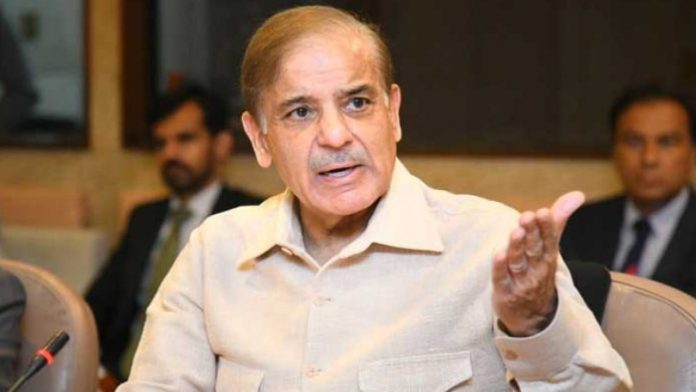—– Says the newly-launched SIFC would propel growth in Pakistan’s industrial, agricultural sectors
—– Asserts one window operation facility for Chinese investors to be fully implemented
—– Lauds foreign investment
—– Hails the role of Chinese leadership in times of economic hardships in Pakistan
Staff Report
ISLAMABAD: Prime Minister Shehbaz Sharif on Monday said that the newly-launched Special Investment Facilitation Council (SIFC) would propel growth in Pakistan’s industrial and agricultural sectors adding that the army chief remains “totally dedicated to the cause of Pakistan”. Addressing an award distributing ceremony among Chinese companies that rendered valuable services in CPEC projects in Pakistan, PM Shehbaz lauded the foreign investment.
Terming SIFC as a ‘great initiative’, the prime minister said that SIFC includes representation from both federal and provincial governments.
“It will include our institutions particularly the institution of Pakistan Army, lead by COAS General Asim Munir, who has personally contributed in this programme in a way that has no parallel in the past,” he said.
PM Shehbaz said the army chief remains “totally dedicated to the cause of Pakistan”. “SIFC will dovetail with this entire CPEC mechanism and will be a propeller in terms of Pakistan’s industrial and agricultural progress,” said PM Shehbaz. The prime minister lauded the role of Chinese leadership in times of economic hardships in Pakistan.
“It is not wrong to conclude that Chinese companies and the government under the leadership of President Xi Jinping have contributed in a way unknown in recent history.”
He said the Chinese companies made more than $30 billion investment in different development projects in Pakistan, which is highly commendable.
“They have transformed the economic landscape of Pakistan. Now we are entering into the second phase of CPEC, which boosts IT and green corridors, as well as Special Economic Zones (SEZs) i.e. Rashakai,” said PM Shehbaz.
The prime minister said these projects would be undertaken through B2B model, under the umbrella of Pakistan and China government.
Addressing Chinese companies, the PM admitted that the companies have faced problems in Pakistan in the past. “I can assure you, those times are over, we are entering into a new phase of cooperation between the two countries, we are streamlining and simplifying the procedures,” he said.
PM Shehbaz assured the Chinese investors that the difficult time for them was now over as “We are going to do this under one umbrella as a one window operation and this I mean in letter and spirit…not just words but true implementation”.
Charge d’affaires of the Chinese Embassy in Pakistan Pang Chunxue said since its launch in 2013, the CPEC being the pilot project of the Chinese Belt and Road Initiatives (BRI) had made remarkable contributions to the socio-economic development of local people of the country.
She said China would always stand firmly with Pakistan and work together to coordinate the country’s development and security areas.
Agencies add: Prime Minister Muhammad Shehbaz Sharif on Monday assured the Chinese investors to further simplify the procedures for the companies working in Pakistan especially under the umbrella of China Pakistan Economic Corridor (CPEC) and implement them in letter and spirit.
He said under the CPEC, the two countries were entering into a new era of cooperation, therefore the government was further streamlining and simplifying the procedures to facilitate the Chinese companies and investors working in the country.
PM Shehbaz assured the Chinese investors that the difficult time for them was now over as “We are going to do this under one umbrella as a one window operation and this I mean in letter and spirit…not just words but true implementation”.
Addressing an award ceremony here, Shehbaz Sharif said that the Chinese government and companies had contributed towards Pakistan’s industrial promotion in various areas and their contribution had not only led to creating job opportunities and industrial production but also further strengthened the bilateral economic ties.
Earlier the prime minister gave awards to top performing Chinese companies working especially in projects under CPEC in Pakistan.
He said recently the two friendly countries had celebrated a decade of CPEC under Belt and Road Initiatives (BRI). He said China had so far invested a valuable $30 billion under CPEC that had really transformed the economic landscape in Pakistan.
“Now we are entering into the second phase of CPEC in which multiple new areas are being incorporated including the green corridor, Information Technology, and Special Economic Zones.
He said the Pakistan government had launched a great initiative “Special Investment Facilitation Council (SIFC)”, which would consist of all main stakeholders including the federal government, all provincial governments and institutions particularly Pakistan Army led by General Syed Asim Munir.
He said the Army Chief had personally contributed in this programme in a way that it had no parallel in the past as he was totally dedicated to promote the cause of Pakistan and the people who had education and talent but no jobs.
“The programme SIFC will dovetail with the entire CPEC mechanism and will be a propeller in terms of Pakistan’s industrial agri progress,” he added.
Minister for Board of Investment (BoI) Chaudhry Salik Hussain said CPEC had ushered a new era of progress and development in various areas including energy, infrastructure, industrial development, agriculture and science and technology.
He said the mega project would help Pakistan localize the products that were currently being imported to fulfill the country’s needs.
Charge d’affaires of the Chinese Embassy in Pakistan Pang Chunxue said since its launch in 2013, the CPEC being the pilot project of the Chinese Belt and Road Initiatives (BRI) had made remarkable contributions to the socio-economic development of local people of the country.
She said China would always stand firmly with Pakistan and work together to coordinate the country’s development and security areas.




